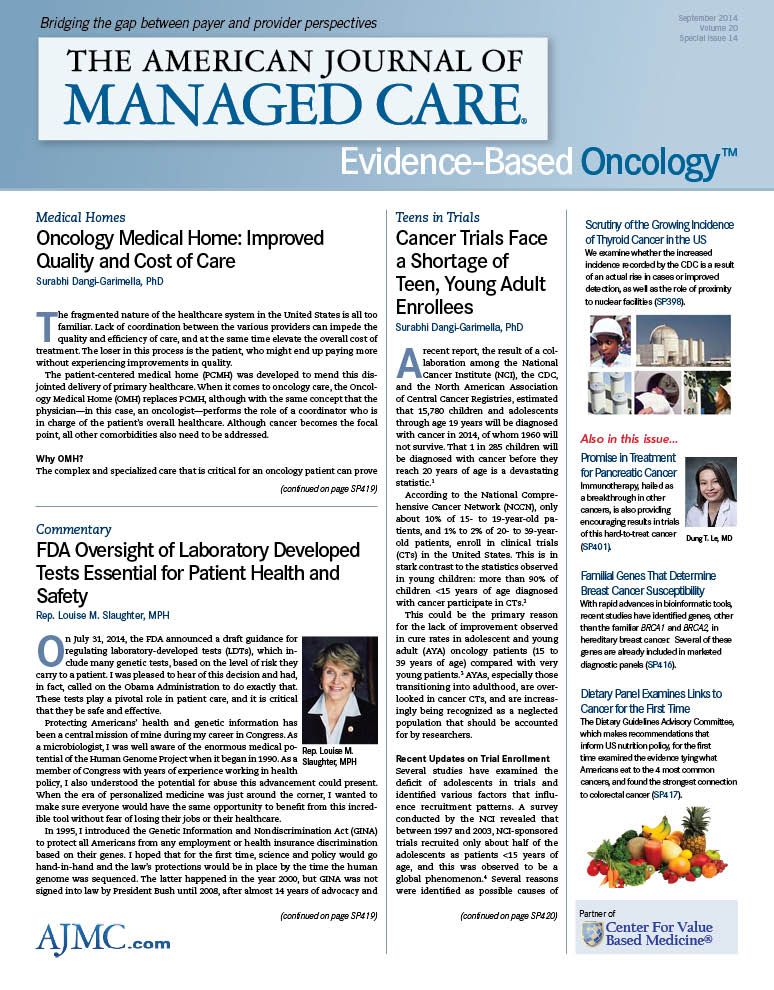- Center on Health Equity & Access
- Clinical
- Health Care Cost
- Health Care Delivery
- Insurance
- Policy
- Technology
- Value-Based Care
AACR Seeks FDA Oversight on LDTs
With an increased awareness and use of personalized medicine, the diagnostic test market is thriving. The tests being marketed run the gamut, from companion diagnostics, to lab-developed tests (LDTs), to direct-to-consumer tests. However, the FDA has not been very stringent about validating these products. This can create
safety issues, since important treatment decisions are based on the results obtained from these tests.
As reported in a previous issue of Evidence-Based Oncology,1 on July 31, 2014, the FDA announced the issuance of a final guidance for companion diagnostics and a risk-based oversight framework for LDTs. While companion diagnostic tests, which can detect specific gene mutations and help select a treatment regimen, have always been FDA-regulated, LDTs are developed by an individual laboratory and thus far have not fallen under the FDA’s jurisdiction.2
The American Association for Cancer Research (AACR), in an effort to hasten the process, issued a policy statement urging the FDA to actively exert its authority to regulate high-risk LDTs that drive physician treatment decisions, including regimens in oncology. According to Charles L. Sawyers, MD, “It is vital that all diagnostic tests used to make high-risk treatment decisions be FDA-approved, so patients and physicians can be assured of the test’s safety and accuracy.”3 Sawyers, a coauthor of the
policy statement, is chair of the Human Oncology and Pathogenesis Program at the Memorial Sloan Kettering Cancer Center in New York and is the immediate past president of AACR.
EBO
Affirming the increasing importance of diagnostic tests in various fields of healthcare, the policy statement, published in Clinical Cancer Research, states, “Patients and physicians should be able to rely on the test results that are forming the basis of high-risk treatment decisions, whether these tests are developed as an LDT or are kits approved by the FDA. Implementation of a risk-based framework by the FDA that would provide for evaluation of all high-risk molecular diagnostic tests would balance the need for encouraging innovative medical product development with the need for ensuring patient safety.”4References
1. Caffrey MK. FDA moves to regulate thousands of diagnostic tests. Am J Manag Care. 2014;20(SP11):SP338.
2. FDA takes steps to help ensure the reliability of certain diagnostic tests [press release]. Silver Spring, MD: FDA; July 31, 2014. http://www.fda.gov/NewsEvent/Newsroom/PressAnnouncements/ucm407321.htm.
3. AACR issues policy statement to urge FDA to provide oversight of high risk laboratory developed tests to protect patient safety and product innovation [press release]. Philadelphia, PA: American Association for Cancer Research; September 9, 2014. http://www.aacr.org/Newsroom/Pages/News-Release-Detail. aspx?ItemID=589#.VBGzXRZ2bSw.
4. Sawyers C and van’t Veer LJ. Reliable and effective diagnostics are keys to accelerating personalized cancer medicine and transforming cancer care: a policy statement from the American Association for Cancer Research [published online]. Clin Cancer Res. 2014. doi:10.1158/1078-0432.CCR-14-2295.

Ambient AI Tool Adoption in US Hospitals and Associated Factors
January 27th 2026Nearly two-thirds of hospitals using Epic have adopted ambient artificial intelligence (AI), with higher uptake among larger, not-for-profit hospitals and those with higher workload and stronger financial performance.
Read More
Exploring Racial, Ethnic Disparities in Cancer Care Prior Authorization Decisions
October 24th 2024On this episode of Managed Care Cast, we're talking with the author of a study published in the October 2024 issue of The American Journal of Managed Care® that explored prior authorization decisions in cancer care by race and ethnicity for commercially insured patients.
Listen
Motivating and Enabling Factors Supporting Targeted Improvements to Hospital-SNF Transitions
January 26th 2026Skilled nursing facilities (SNFs) with a high volume of referred patients with Alzheimer disease and related dementias may work harder to manage care transitions with less availability of resources that enable high-quality handoffs.
Read More

